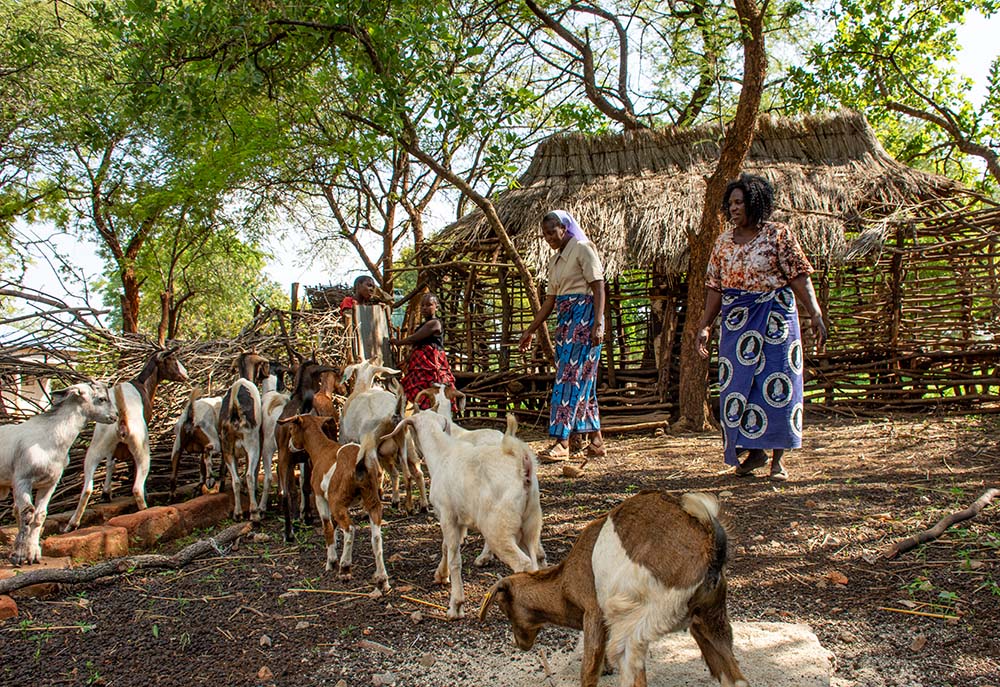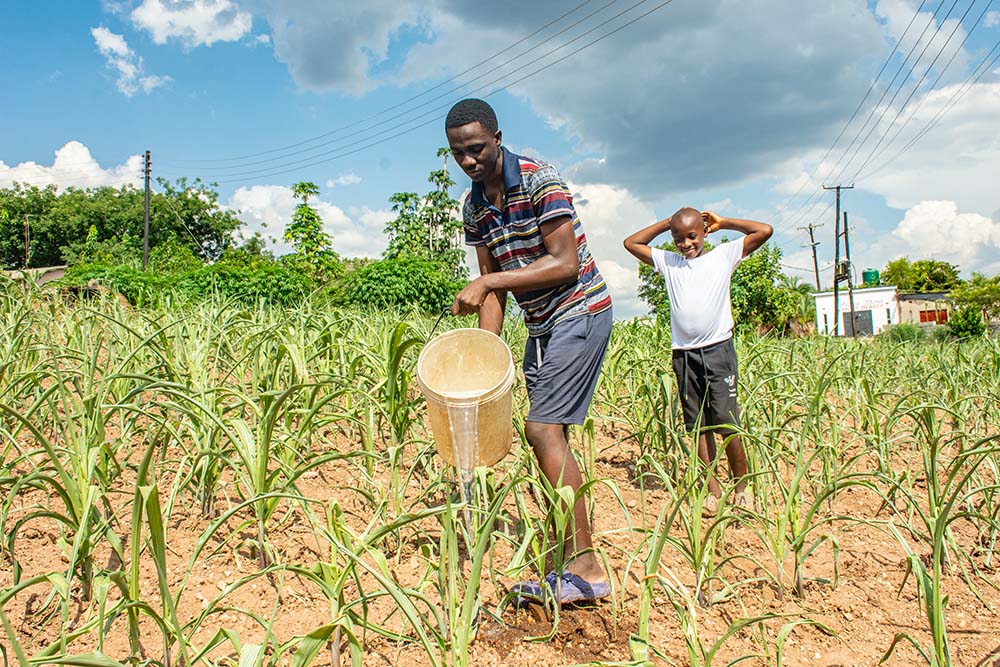
Sr. Juunza Mwangani, center, project manager for the Religious Sisters of the Holy Spirit, inspects some of the local women beneficiaries' agricultural projects in Magoye's Mbiya village, in Zambia's Mazabuka District. (Derrick Silimina)
In the parched terrain of Magoye in Zambia's Mazabuka District, about 150 km south of the capital Lusaka, Dixon Lungu braves the blistering afternoon heat as he waters his scorched maize crop.
As the days turn into weeks without rain, Lungu understands the importance of the rainy season better than most. Every drop of water is precious on his 1-hectare farmland, where he grows maize.
"It's been over a month without rain after the planting season, so the effect on the maize field is very bad. We're just praying to God for rainfall so we can have something to eat," he told Global Sisters Report.
He expressed concern that if the dry spell continues to hit Zambia's staple food and cash crop, the government will have no choice but to source food aid to feed its citizenry as the once lush fields of the Magoye area lie barren, a vivid reminder of the effects of climate change.
Despite last year's drought, Lungu harvested about 13 bags of maize, each weighing 50 kilograms.
"Looking at my current withered maize field, I doubt I will get even 10 bags this year," he said.
The Emerging Farmers Initiative (EFI), established in 2019 by the Religious Sisters of the Holy Spirit, offers a way out of poverty for local youth and at-risk families. The project combines academic education with eco-friendly integrated farming skills and entrepreneurship literacy for young people and established small-holder farmers at the New James Corboy S.J. Secondary School under the Monze Diocese.

Dixon Lungu braves the blistering afternoon heat as he waters his scorched maize crop in Magoye, Mazabuka District, Zambia. (Derrick Silimina)
"For over 10 years now, the southern part of Zambia has been hit by drought. Even when the rest of the country receives rain, this region suffers droughts the most. So it dawned on us that climate change has become real for us," Sr. Juunza Mwangani told GSR.
In response to the effects of climate change, Mwangani, who is the project manager of the Sisters of the Holy Spirit, recognized the opportunity among the people of southern Zambia, who are farmers by nature.
"Our calling now is to journey with our people, to face how we will survive the effects of climate change. We are also called to work with the people in their very culture and in their way of life," Mwangani said.
She said that since 2022, the smart agriculture training hub has produced more than 100 graduates in fisheries, gardening, piggery and poultry for egg and meat production. The facility is equipped with a feed production unit and a drip irrigation system, all integrated to ensure the efficient use of water resources, which is crucial in Mazabuka's arid climate.
Regardless of their academic background, young people are equipped with hands-on training in eco-friendly agriculture, enabling them to create sustainable livelihoods among their communities for generations to come.
While other teenagers are attracted to early marriages after dropping out of school and seeking odd jobs in the Nakambala Sugar Estate, Jenipher Habeenzu is excited about pursuing a lifelong agriculture skill that will one day usher her into agribusiness.
Advertisement
Habeenzu, 23, is among 50 young people currently enrolled in the general agricultural course at the New James Corboy S.J. Secondary School production unit.
"I have learned quite a lot during my six-month course here. I understand how vital it is to take agricultural production as a business," Habeenzu said.
Mwangani said local women have not been left behind. The Religious Sisters of the Holy Spirit have taught the project to the Handmaids of the Blessed Virgin Mary, the Missionary Sisters of the Precious Blood, the Sisters of the Sacred Hearts of Jesus and Mary, and the Religious Sisters of Charity.
She said that local beneficiary women are encouraged to work with crops and livestock so that when the crop fails, their livestock can thrive and raise household income.
"Each of the five congregations has called on 15 more women to work with. Each woman is to mentor two other women in integrated agriculture for the initiative to have a ripple effect," Mwangani said.
She said they started with one congregation, then expanded from four to 75 women, and doubled because their emphasis is on food security, an issue women struggle greatly with.
"I have learned quite a lot during my six-month course here. I understand how vital it is to take agricultural production as a business," Habeenzu said.
Mwangani said local women have not been left behind. The Religious Sisters of the Holy Spirit have taught the project to the Handmaids of the Blessed Virgin Mary, the Missionary Sisters of the Precious Blood, the Sisters of the Sacred Hearts of Jesus and Mary, and the Religious Sisters of Charity.
She said that local beneficiary women are encouraged to work with crops and livestock so that when the crop fails, their livestock can thrive and raise household income.
"Each of the five congregations has called on 15 more women to work with. Each woman is to mentor two other women in integrated agriculture for the initiative to have a ripple effect," Mwangani said.
She said they started with one congregation, then expanded from four to 75 women, and doubled because their emphasis is on food security, an issue women struggle greatly with.
On the brink of starvation, Eucaria Hamaundu, a peasant farmer in the Magoye area, reminisced about the drought during the 2023-24 farming season that hit the southern African country, leaving millions in need of lifesaving assistance.
"Many thanks to the sisters for building local women's capacity in integrated farming and eco-friendly agricultural practices. I was empowered in March 2024 with five goats, which have since reproduced to 15," said the 60-year-old, one of the local beneficiaries of the project.
Charity Hamukulule, another beneficiary, is aware of the looming drought due to the effects of climate change, which will likely induce a food crisis in her community.
Hamukulule, 50, from the Magoye area, works tirelessly as the breadwinner of her female-headed household, supporting a family of 10 through subsistence agriculture.
"The sisters' EFI project is an eye-opener. Instead of relying on rain-fed crop production, I diversified into poultry production and horticulture. I can now afford to feed and take care of my children's educational needs," she added.
Last summer's blistering El Niño ravaged Zambia, impacting both the country's food and energy security. Weather experts have anticipated that the subsequent likelihood of La Niña in 2024-25 — a weather phenomenon that brings wetter and cooler summers to southern Africa — is now low, a development that could lead to crop failure and food insecurity.
Mazabuka District veterinary officer Irvin Mweetwa acknowledged that the sisters' eco-friendly and integrated agricultural project is a life-changer in the district.
"Our collaboration with the sisters is a success thus far. This project aligns with government policy of addressing youth unemployment and engaging local women to embrace innovative agricultural practices to boost their household income amid the effects of climate change."






